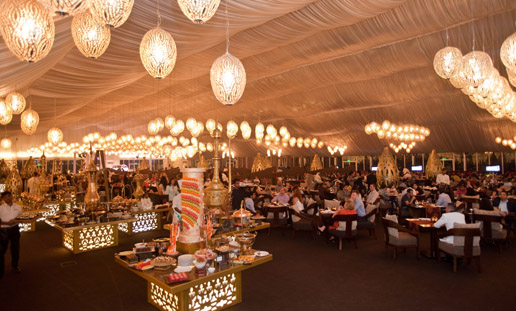On the True Nature of a City

Day Two in Dubai was a whirlwind of The Modist’s operations center, studio and offices, followed by a glorious iftar and suhoor in a majlis setting - the traditional seating of the bedouins, a little more jazzed up (exhibit A, pictured).
The entire trip has been a thought provoking experience, providing many moments of reflection as I pack my bags to leave the city. It’s intriguing to note that although I have been here many times before, this trip has somehow been so different. Perhaps it’s because I am not traveling with family, because I am not wearing the more traditional clothing (of a jalabeeya or abaya, that I would usually wear in the Arab world), perhaps because I’m a little older and wiser… it’s likely a combination of all the above. But I’ve had the pleasure and honor of seeing Dubai and the UAE in a light I’ve never seen it before, and that’s largely due to seeing it through the eyes of it’s many types of inhabitants.
It reminds me of an old film I saw by a director named Ali Mostafa that my father took our family to see at the Arab film festival years ago. City of Life was a film about Dubai’s parallel existences. It was almost never shown, due to it’s very real depiction of life in the UAE with all it’s light and shade, however a last minute pardon from the country’s ruler meant it graced our screens. It broke box office records, toured internationally and launched the career of Mostafa, who has gone on to make successful Emirate films across various genre (comedy, thriller, etc). Word on the street is that City of Life 2 is in development, so I look forward to it, inshallah!
The reason why the film is so powerful is that it depicts what I still feel about Dubai, despite having a slightly richer understanding: the lives of folks are so separate from each other. Emiratis, who make up less than 20% of the population of the UAE, may go to the same schools and universities as the expatriates, but rarely marry foreigners, and seem to keep their culture - as rich as it is - close to home, reserving it for family and close friends in a way that is different to say, the Levant folk just nearby. Expatriates love the place for its opportunity and luxury and comfort, but feel slightly out of sorts by not being able to really ever have a path to citizenship, making one feel like a visitor no matter how long they’ve lived there. As for the service folk - the majority from South East Asia and the Sub continent - I wasn’t able in my time here to have a conservation that was beyond the superficial, but it seems to the observer to be a system whereby they are not afforded the same comforts citizens and expatriates enjoy. Why they are not even considered expatriates - given they are here for work - is a clue into the informal caste system that has somehow found it’s way into the development process of the region…
I could wax lyrical about my feelings and reflections. At the moment they are poorly formed, vague inferences rather than solid conclusions. However, what I do know is that I have been treated so kindly, welcomed so warmly and made to feel so comfortable - mashallah - that one thing is for sure. The culture of hospitality is alive and strong, and runs through the Dubai DNA.
(PS - they also seem to revere Sheikh Mohammed and Zaid in a way I haven’t heard of a leader - alive - who is respected in the same way. Fascinating! But for another day - I’ve gotta catch a plane!).
Much love,
Yassmin
Just figuring it all out, ya know 😅😇





